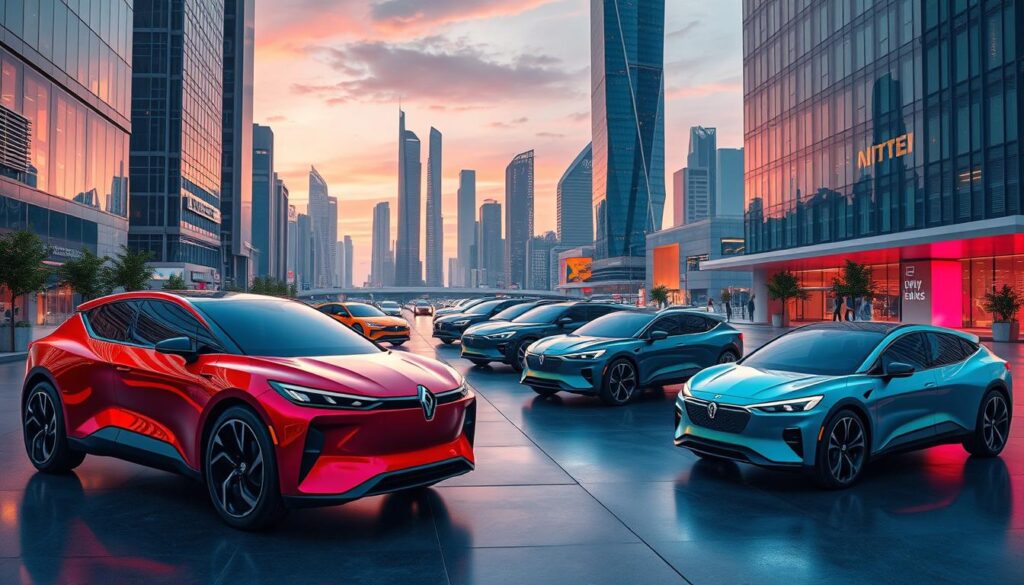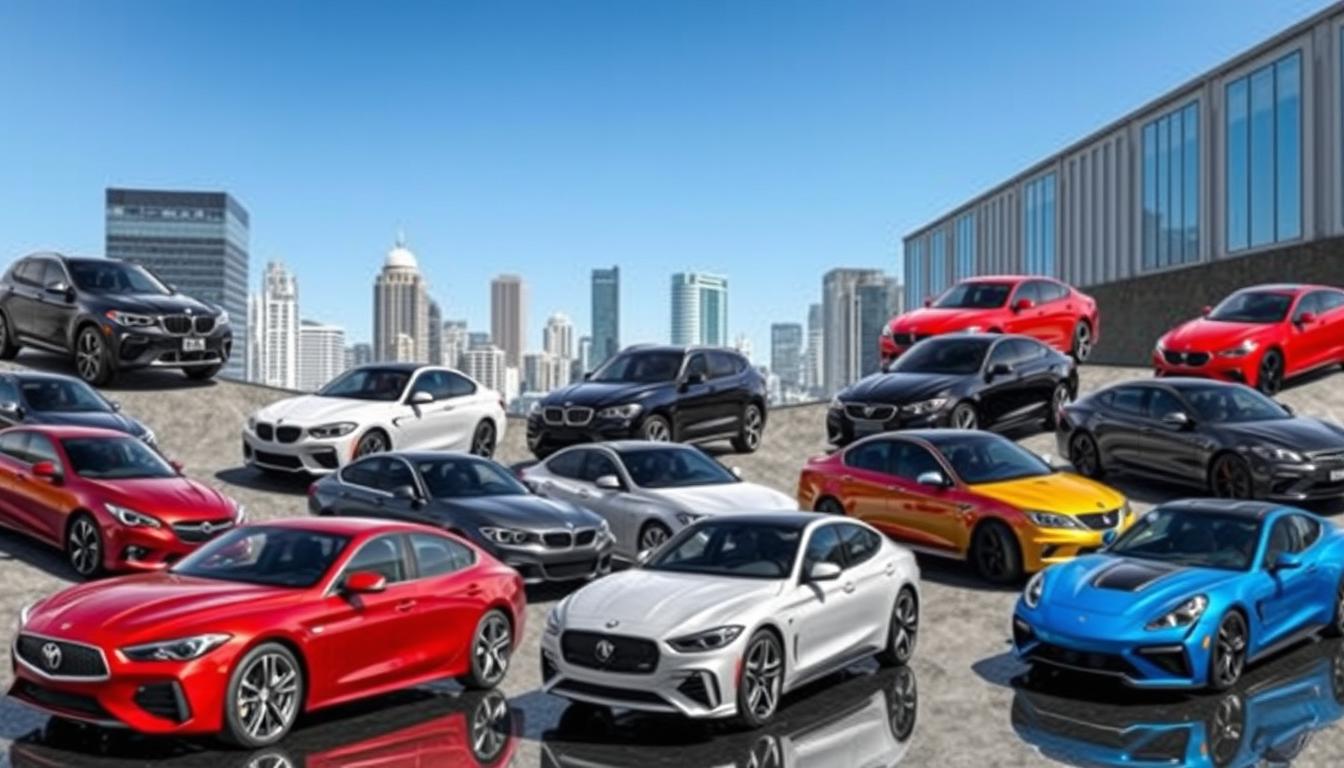Did you know that over 60% of consumers consider brand reliability as their top priority when purchasing a vehicle? This staggering statistic underscores the significance of discerning what distinguishes the best car brands in today’s competitive market. This guide delves into the factors that contribute to a brand’s reputation, encompassing reliability, style, innovation, and consumer satisfaction. Insights from reputable sources such as J.D. Power, Consumer Reports, and Kelley Blue Book provide a comprehensive understanding of the top car brands and the top-rated car companies that lead the industry.
Whether your preference leans towards a practical sedan, a stylish SUV, or an eco-friendly electric vehicle, recognizing the characteristics of the best car brands is crucial for your purchasing decision. Prepare to delve into the realm of automobiles, as we expose the most reliable and stylish options available today. For additional insights on the best car brands, refer to this best car brands overview.
Key Takeaways
- Brand reliability is a top consideration for 60% of consumers.
- The reputation of car brands is shaped by factors like innovation and consumer satisfaction.
- Insights from industry reports can guide your vehicle purchasing decisions.
- Understanding the strengths of various car brands helps you find the best fit.
- Exploration of eco-friendly options is increasingly important in today’s market.
Overview of Car Brand Rankings
In the realm of automotive rankings, two elements frequently capture the spotlight: reliability and style. The perception of a brand significantly impacts consumer decisions, as many seek out vehicles that excel in performance and captivate onlookers. This dual criterion underscores the importance of identifying the premier car brands.
Understanding the Importance of Brand Reliability
Reliability is a paramount concern for prospective vehicle owners. It encompasses aspects such as reduced malfunction rates and elevated owner satisfaction. Consumers often rely on authoritative sources like J.D. Power and Consumer Reports, which meticulously evaluate the most dependable car brands. These assessments, grounded in real-world feedback, are pivotal in determining the trustworthiness of leading automobile manufacturers.
The Role of Style in Car Brands
Style, though secondary to reliability, is indispensable in drawing in potential customers. A vehicle’s visual appeal can significantly boost its desirability, setting a brand apart in a competitive market. Renowned car brands prioritize both performance and design, offering a diverse array of models to cater to varied preferences.
Top 10 Most Reliable Car Brands
In the realm of automotive acquisition, the criterion of reliability emerges as paramount. The pinnacle of automotive excellence is occupied by brands distinguished by their unwavering performance and consumer contentment. Through meticulous evaluations of reliability metrics, warranty provisions, and customer service interactions, a discernible hierarchy of the most dependable automotive entities is established. This facilitates the identification of the premier automotive entities catering to diverse consumer preferences.
Highlights from Each Brand
An overview of the vanguard automotive brands celebrated for their reliability is presented below:
- Toyota: Renowned for its unparalleled reliability and enduring lifespan, it garners widespread acclaim among consumers.
- Honda: Exhibits remarkable engineering prowess and a robust reputation for longevity.
- Subaru: Acclaimed for its all-wheel drive technology and steadfast performance, particularly in adverse climatic conditions.
- Lexus: Emerges as a paragon among luxury brands, seamlessly integrating opulence with exemplary reliability.
- Mazda: Admired for its dynamic driving dynamics and commendable reliability metrics.
- Kia: Has ascended the reliability rankings swiftly, thanks to its comprehensive warranties and dependable vehicle offerings.
- Hyundai: Provides a diverse array of models that adeptly balance affordability with reliability.
- Ford: Traditionally celebrated for its trucks, its newer models exhibit significant strides in reliability.
- Chevrolet: Emphasizes durability across its extensive model range, resonating with consumers seeking dependable vehicles.
- Nissan: Continues to captivate with its amalgamation of performance and stability across its model spectrum.
Consumer Reports Insights
Consumer Reports periodically updates its ratings, grounded in exhaustive vehicle testing and consumer feedback. These updates consistently affirm the reliability of certain automotive brands, bolstering consumer confidence. The evaluations, driven by real-world performance, warranty records, and customer satisfaction, serve as indispensable resources for prospective automobile purchasers. They enable the selection of the most reliable automotive entities available in the market.
Stylish Car Brands Worth Noticing
In the realm of automotive innovation, the allure of stylish car brands resides at the nexus of aesthetics and functionality. The synergy between a captivating exterior and robust engineering capabilities can significantly influence public perception and affection. Brands such as Tesla and BMW exemplify the symbiotic relationship between visual appeal and driving dynamics, solidifying their status as industry leaders.
Their commitment to modern design and meticulous attention to detail underscores their reputation as premier automotive entities. This synergy between form and function is a testament to their dedication to excellence in the automotive sector.
The Intersection of Design and Performance
Consumer preferences increasingly gravitate towards vehicles that combine practicality with visual allure. Stylish car brands continually refine their designs to align with contemporary aesthetics while upholding performance standards. Audi and Mercedes-Benz, for instance, have distinguished themselves by seamlessly integrating artistic design with technological innovation.
This approach demonstrates that aesthetic appeal and operational efficiency can be mutually reinforcing. Such brands have successfully redefined the automotive landscape, showcasing that beauty and utility are not mutually exclusive.
Icons of Automotive Design
The automotive domain is replete with icons that have left an indelible mark through their designs. These models, ranging from classic to contemporary, continue to inspire and influence future designs. Ferrari and Jaguar, among others, have set benchmarks for luxury and sportiness, creating vehicles that are not only symbols of prestige but also reflections of the brand’s ethos and craftsmanship.
Each model serves as a narrative, encapsulating the brand’s vision and the passion of its creators. These vehicles embody the essence of automotive artistry, showcasing the pinnacle of design and engineering excellence.
The Impact of Technology on Car Brands
Technology has profoundly transformed the automotive sector, delivering vehicles that are not only smarter and safer but also more efficient. These innovations transcend mere upgrades, instead, they serve as the hallmark of the leading car brands in today’s market. The integration of cutting-edge features, such as advanced driver-assistance systems and sophisticated infotainment options, has catapulted several manufacturers to the forefront of this competitive arena.
Innovations Driving Today’s Car Brands
Top automotive brands are committing substantial resources to technological advancements, aiming to fulfill the evolving needs of consumers. Key innovations include:
- Advanced Driver-Assistance Systems (ADAS) – These systems significantly enhance safety, offering functionalities like lane-keeping assist, adaptive cruise control, and automatic emergency braking.
- Infotainment Integrations – Modern vehicles are equipped with intuitive infotainment systems, enabling seamless connectivity with smartphones and other devices, thereby transforming the driving experience.
- Electric Vehicle Technology – As environmental consciousness escalates, leading car manufacturers, such as Tesla, are pioneering with their advanced electric vehicles, showcasing remarkable performance and extended range capabilities.
Leading Brands in Automotive Tech
Brands distinguished by their technological prowess lead the industry. Tesla, for example, is celebrated for its groundbreaking electric vehicle technology and autonomous driving innovations. Toyota, on the other hand, continues to excel with its hybrid technology and dedication to sustainability. These companies exemplify how technological integration not only improves performance but also strengthens the bond with consumers.
The Best Eco-Friendly Car Brands
The automotive sector’s transformation is evident in the increasing demand for vehicles that prioritize environmental stewardship. Leading brands in this domain concentrate on eco-friendly cars, championing sustainability through cutting-edge designs and practices. Their focus on hybrid and electric options is significantly reshaping the market landscape.
Commitment to Sustainability
Manufacturers such as Nissan, Honda, and Chevrolet exemplify a steadfast dedication to sustainability. These entities endeavor to diminish their ecological impact through the adoption of greener production methodologies and investments in renewable energy. Their emphasis on environmentally responsible practices underscores their commitment to planetary well-being.
Notable Hybrid and Electric Options
Within their portfolios, several eco-friendly models emerge as standouts. The Nissan Leaf and Honda Insight, for instance, epitomize efficiency and emission reduction through their hybrid configurations. The Chevrolet Bolt EV, meanwhile, offers a fully electric solution with an impressive range. This array of hybrid and electric options caters to a diverse consumer base, underscoring their dedication to a sustainable future.
Luxury Car Brands That Impress

The quest for a vehicle that marries luxury with performance is a daunting yet exhilarating endeavor. It necessitates a meticulous selection process, balancing style, comfort, and cutting-edge technology. Esteemed for their unparalleled quality, the crème de la crème of luxury car brands include Mercedes-Benz, BMW, and Audi. These venerated manufacturers prioritize a superior driving experience, catering to the refined tastes of discerning consumers.
Features that Define Luxury
Luxury vehicles are distinguished by unique attributes that enhance the driving experience. These include:
- High-Quality Materials: The use of fine leather and premium woods in upscale interiors sets luxury brands apart.
- Advanced Technology: State-of-the-art infotainment systems and driver-assistance technologies significantly improve safety and convenience.
- Superior Comfort: Plush seating, climate control, and refined handling create an oasis for drivers and passengers alike.
Leading the Pack in Comfort and Style
Among luxury car brands, certain models stand out for their exemplary comfort and style. Mercedes-Benz, for instance, consistently delivers vehicles that exude elegance while offering unmatched comfort. Lexus is renowned for its quiet cabin and smooth ride, making it a preferred choice for long journeys. These industry leaders continuously innovate, setting trends that other manufacturers aspire to emulate.
Factors to Consider When Choosing a Brand
In the realm of automotive selection, several pivotal factors emerge, significantly shaping one’s decision-making process. Paramount among these are reliability ratings and maintenance costs. These elements are crucial for forecasting the long-term vehicular experience, thereby guiding the selection of the most superior car brands.
Evaluating Reliability Ratings
Reliability stands as a paramount concern for prospective vehicle owners. Institutions such as J.D. Power and Consumer Reports offer exhaustive reliability assessments, enabling consumers to assess a brand’s performance over extended periods. Brands boasting high reliability ratings are typically characterized by fewer mechanical malfunctions, thereby reducing the financial burden and time investment in repairs. An examination of these ratings is indispensable for identifying the most reliable car brands that meet one’s expectations.
The Importance of Maintenance Costs
Maintenance expenses are a critical determinant of the overall ownership experience. For those prioritizing fiscal prudence, opting for brands with lower maintenance costs can be particularly appealing. An analysis of typical maintenance expenditures and repair histories facilitates the identification of car brands that strike a balance between reliability and affordability. For a more nuanced exploration of cost-effective vehicle options, consider engaging with rental services that afford the opportunity to test various models before making a definitive purchase.
The Role of Consumer Reviews in Rankings
Consumer reviews are pivotal in shaping the rankings of premier automotive brands. Insights from actual vehicle owners shed light on performance and reliability, often uncovering aspects missed by initial assessments. These reviews underscore the long-term durability and customer satisfaction, offering potential buyers a more nuanced understanding of the best car companies.
Feedback from Real Owners
Real-world experiences, as shared through consumer reviews, provide a unique perspective, distinct from professional evaluations. Customers frequently discuss:
- Fuel efficiency and overall cost of ownership.
- Comfort and driving ease.
- Customer service experiences with dealers.
This feedback profoundly impacts perceptions of various models from leading automotive brands. Owners’ opinions can significantly alter a manufacturer’s reputation, steering new buyers toward highly praised models and away from those that fail to meet expectations.
How Reviews Shape Brand Perception
Online ratings and reviews are instrumental in consumer decision-making processes. They offer a real-time glimpse into how vehicles perform in everyday life. Many consumers rely on platforms that compile reviews, enabling them to compare cars effectively. Enthusiastic endorsements or severe criticisms in consumer reviews can profoundly influence a buyer’s perception, enhancing or diminishing brand image. Grasping the subtleties in reviews empowers consumers to make informed decisions as they explore the options presented by the best car companies. For additional insights on consumer products and feedback-driven decisions, refer to this informative article on top educational apps.
Emerging Car Brands to Watch

The automotive sector is witnessing a profound metamorphosis, with a plethora of nascent automotive entities entering the fray. These newcomers are boldly challenging conventional paradigms, introducing groundbreaking technologies to the forefront. Their emphasis on eco-friendliness, electric propulsion, and distinctive aesthetics is carving out distinct niches within a fiercely competitive arena, traditionally dominated by stalwarts of the automotive world.
New Entries in the Automotive Market
Recent headlines have been dominated by entities that embody a forward-thinking ethos. Rivian and Lucid Motors, for instance, exemplify the potential of emerging automotive brands. They are not merely expanding the horizons of electric vehicle performance but are also redefining consumer aspirations. Through the incorporation of avant-garde technology and sophisticated design, these entities are demonstrating that innovation can indeed compete with established titans.
Innovative Startups Changing the Game
Startups are renowned for their capacity to disrupt established norms and challenge the status quo, creating vehicles that resonate with contemporary consumer demands. The defining traits of these pioneering entities include:
- Focus on Sustainability: Many emerging car brands prioritize eco-friendly materials and production processes.
- Advanced Technology: Integration of AI and smart technology enhances the driving experience.
- Customer-Centric Designs: Many of these brands offer customizable options and unique features that cater to individual preferences.
As these transformative brands continue to evolve, they are poised to exert a profound impact on the automotive industry’s future trajectory.
American vs. Foreign Car Brands
The ongoing discourse between American and foreign automotive entities captivates the interest of aficionados and prospective consumers alike. Each faction boasts distinct attributes and liabilities, thereby shaping the preferences of the market.
Pros and Cons of Each
Brands such as Ford and Chevrolet, hailing from the American continent, are celebrated for their formidable construction and potent powertrains. Their affordability serves as a considerable advantage, broadening their appeal to a wider demographic. However, certain critics voice concerns over fuel economy and the perceived inferiority of their interior aesthetics.
In contrast, entities like Honda and Toyota, rooted in foreign territories, are renowned for their exemplary reliability and enduring lifespan. These brands consistently integrate cutting-edge safety and technological innovations. Nonetheless, their premium pricing and potentially elevated maintenance expenditures are drawbacks that some consumers grapple with.
How They Compare in Reliability and Style
In the realm of reliability, foreign brands frequently garner accolades in consumer surveys. This sterling reputation for dependability is a magnet for individuals seeking assurance in their automotive investments. Conversely, American manufacturers often emphasize audacious designs and exhilarating performance, resonating with those who crave a more assertive driving experience. For a more detailed exploration, readers are directed to this enlightening piece on the comparison between foreign and American automobiles.
The Future of Car Brands
The automotive sector is undergoing a profound metamorphosis, propelled by shifting consumer inclinations and technological progress. The trend towards electric vehicles and the advent of autonomous driving technology will shape the destiny of car brands. As environmental consciousness and digital integration ascend to prominence, leading manufacturers must adapt to remain among the elite.
Trends Shaping the Industry
Current trends within the automotive sector indicate a burgeoning demand for eco-friendly options. Consumers increasingly prioritize vehicles that combine performance with ecological advantages. In response, premier brands are investing in electric vehicle technologies and enhancing the user experience through advanced connectivity features. Key trends include:
- Escalating adoption of electric vehicles, highlighting sustainability.
- Integration of advanced driver-assistance systems (ADAS) for enhanced safety.
- Expansion of in-car digital ecosystems, featuring advanced infotainment systems.
Predictions for Next Decade
Experts foresee a future where the automotive landscape undergoes further evolution. The forthcoming decade will likely witness:
- An expanded array of electric and hybrid models from both established and nascent brands.
- Substantial progress in self-driving technology, with some brands targeting full autonomy.
- Intensified collaborations between car manufacturers and technology entities to foster innovation.
As these trends materialize, consumers can anticipate a radical transformation in the automotive industry’s landscape. For deeper insights into new car brands and their innovations, explore this link: new car brands.
Conclusion: Choosing the Best Car Brand for You
In contemplating the myriad factors influencing the selection of superior automotive brands, it becomes imperative to harmonize personal exigencies with an appraisal of brand reputation. The automotive sector presents an extensive array of alternatives, each brand boasting distinct advantages, ranging from dependability to avant-garde technological innovations. It is crucial to evaluate which attributes hold paramount importance for you, encompassing fuel efficiency, safety attributes, or aesthetic and performance considerations. Your individual prerequisites should serve as the compass guiding your decision-making, ensuring the acquisition of a vehicle that resonates with your lifestyle and financial constraints.
Personal Needs vs. Brand Reputation
The influence of brand reputation on consumer sentiment is undeniable, yet prioritizing personal needs can culminate in enhanced satisfaction. Renowned automotive brands frequently boast a legacy of dependability and performance, yet the quintessential vehicle for you might reside beyond the realm of conventional favorites. For example, venturing into the domain of lesser-known brands, such as Toyota’s eco-friendly offerings or Tesla’s innovative designs, could unveil unexpected gems tailored to your specific tastes. The equilibrium between personal needs and established reputation can culminate in a gratifying acquisition that seamlessly integrates into your daily routine.
Final Thoughts on Making Your Decision
The odyssey towards identifying the optimal automotive brand hinges on a meticulous assessment of personal needs against the spectrum of available choices. By integrating insights from entities like Consumer Reports and J.D. Power, and juxtaposing the attributes of premier automotive brands, you will be well-prepared to make an enlightened decision. Embrace the exploration process, and recall that the ideal vehicle should fulfill your practical needs while also evoking joy in your daily commutes.
